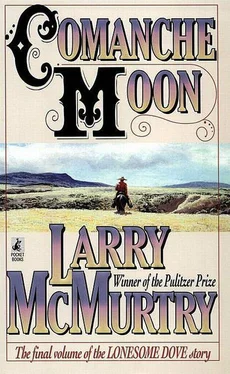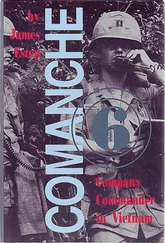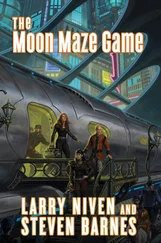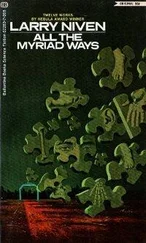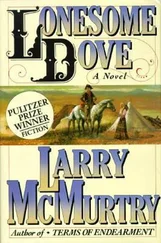But it did not seem to shame the young men--they spoke only of the Texans they had killed and said nothing about the warriors who were lost and whose bodies had been abandoned.
Usually, after such a raid, a few of the old men would come to Buffalo Hump in his new camp, to discuss the shameful losses and the even more shameful abandonment of bodies. Some of the elders, old Sunrise in particular, wanted Buffalo Hump to speak to the young men; they wanted him to ride with them on a raid, to instruct them of the correct way to behave toward the dead; but Buffalo Hump refused: he would not ride with warriors who didn't want him. The young men had no use for him now--they made that clear by the arrogant looks they gave him when he walked through the camp or rode out to the horse herd to watch the young horses.
When the old men came to him with their complaints he listened but did not say much in reply. He had led the band for a long time, but now could not. Let the young men decide who should be chief; let them do without a chief, if they could not decide. After all, any warrior could follow anyone he wanted to--or follow no one, if that was his choice. Buffalo Hump did not like what he saw, but he could do little about it. His own time was short--it had almost ended in the weeks of his sickness--and he did not intend to use it giving advice to young men who did not want it.
With Kicking Wolf, though, he sometimes did talk and talk frankly about what the large losses meant.
"The Texans have learned to fight us," he said.
Heavy Leg had caught a fat coon in a snare and was cooking it.
"Some have," Kicking Wolf admitted. "Some are fools." "Yes, some are fools, but Gun In The Water is not a fool, and neither is McCrae," Buffalo Hump said. "They don't get scared now just because we yell at them--theirthe men wait until we are close and then they shoot us. They have better guns now--if they had better horses they would follow us and kill us all." "Their horses are too fat and too slow," Kicking Wolf agreed.
"That is because you have stolen so many of the good ones," Buffalo Hump told him. Though Kicking Wolf had often annoyed him, it was clear that he was the best horse thief the tribe had ever produced. Now he felt annoyed again, but it was not because Kicking Wolf had been rude. Kicking Wolf had always been rude. What was annoying was that he was younger--he had not been sick, and the hand of age had not touched him. The young men made a little fun of him, but not much. They didn't fear him as a fighter, but they respected him as a thief.
"Slow Tree has sat down with the white man," Kicking Wolf informed him one day. "So have Moo-ray and Little Cloud. They are all going to the place the whites want to put them, near the Brazos. The Texans have promised to give them beef." That news came as no surprise to Buffalo Hump. He had never sat down with the white men and never would, but it did not surprise him that Slow Tree and others, worn out by the difficulty of feeding their bands, would talk with the whites and go to the places the white men wanted to put them.
"It is because the buffalo have left," Kicking Wolf said, a little apologetically. Buffalo Hump was looking angry. He did not like the news that Comanches were giving in to the white men, ceasing to fight or be free. Yet he knew how thin the game was; he saw that the buffalo were gone.
"The buffalo haven't left the world," Buffalo Hump told him. "They have only gone to the north, to be away from the Texans. If we go north we can still kill buffalo." "Slow Tree and the other chiefs are too old," Kicking Wolf said. "They don't like to go into the snows." "No, I see that," Buffalo Hump said.
"They had rather sit with the Texans and make speeches. They had rather be given beef than steal them, although cattle are easy to steal." Kicking Wolf was sorry he had mentioned that the chiefs were too old. It brought anger to Buffalo Hump's face. He was fingering his knife, the cold look in his eyes. Kicking Wolf understood that the anger was because Buffalo Hump himself was now old--he could not ride the war trail again.
It was known that he planned to go north, to hunt buffalo alone. Kicking Wolf thought that was foolish but he didn't say anything. There were many whites to the north and they did have good guns.
"Would you let the whites tell you where to live?" Buffalo Hump asked him. "Would you let them buy you off for a few of their skinny beeves?" "No, I would rather eat horsemeat than beef," Kicking Wolf said. "I can eat the horses I steal. I will never sit down with the whites." There was a long silence. The coon had been chopped up--it was bubbling in the pot. The flesh sagged on Buffalo Hump's arms and his torso was thin now--his hump seemed as if it would pull his body over backward.
"Doesn't Slow Tree have horses he could eat?" Buffalo Hump asked. "Doesn't Moo-ray?" "They have some horses," Kicking Wolf said.
"I think they are just tired of fighting. Many of their young men have been killed, and their women are unhappy. They have been fighting for a long time." "We all have been fighting for a long time," Buffalo Hump reminded him. "We have been fighting for our whole lives. That is our way." He was silent again. He had begun to think that it was time for him to leave his people--perh even leave his wives. If, one by one, the chiefs of the various bands were giving up, making peace with the white men, then the time of the free Comanche was over--and so was his own time. Perhaps he should go away, alone, and seek a place to die. The greatest warriors inconvenienced no one when their time was ending. They simply went away, alone or with one old horse. Of course it was a thing rarely done now, a custom that was almost forgotten; the Texans had made it hard for any man to survive long enough to come to the natural end of his time. Now so many warriors fell in battle that few could survive until they could die with dignity, in the old way.
Buffalo Hump did not want to discuss this possibility with Kicking Wolf. He wanted only one more piece of information: he wanted to know about Quanah, the young chief of the Antelope band, the Comanches who lived the farthest west, in the barren llano. These Comanches had never sat down with the whites. They survived in their harsh land even when the buffalo didn't come. The Antelope Comanches would live on roots and grubs, on weeds and prairie dogs and bulbs they dug from the earth. Buffalo Hump himself had only been among the Antelope Comanches once or twice in his life; they lived too far away, and were not friendly--the fact that they were not friendly was something he had come to admire. They lived in their own place, in the old way, hunting, moving as the game moved, finding enough water to survive in a place where no one else could find water. The Antelope rarely fought the whites, because the whites could not find them. When the whites came the Antelope merely retreated deeper and deeper into the long space of the llano. Always, the whites ran out of food and out of water before they could attack them. Antelope knew their country and could survive in it; the whites didn't know it, and feared it. Even Famous Shoes, the Kickapoo who went everywhere, did not try to follow the Antelope Comanches to their watering holes.
Even he found the llano too hard a test.
Now Buffalo Hump had heard that there was a young chief of the Antelope band--his name was Quanah. Though scarcely more than a boy he was said to be a great fighter, decisive and terrible in battle, a horseman and hunter, one who had no fear either of the whites or of the country. The talk was that Quanah was half white, the son of Peta Nocona and the captive Naduah, who had been with the Comanche for many years. She had been taken in a raid near the Brazos when Buffalo Hump himself had been young. Naduah had been with the People so long that she had forgotten that she was a captive--now her son led the Antelope Comanches and kept his people far from the whites and their councils.
Читать дальше
